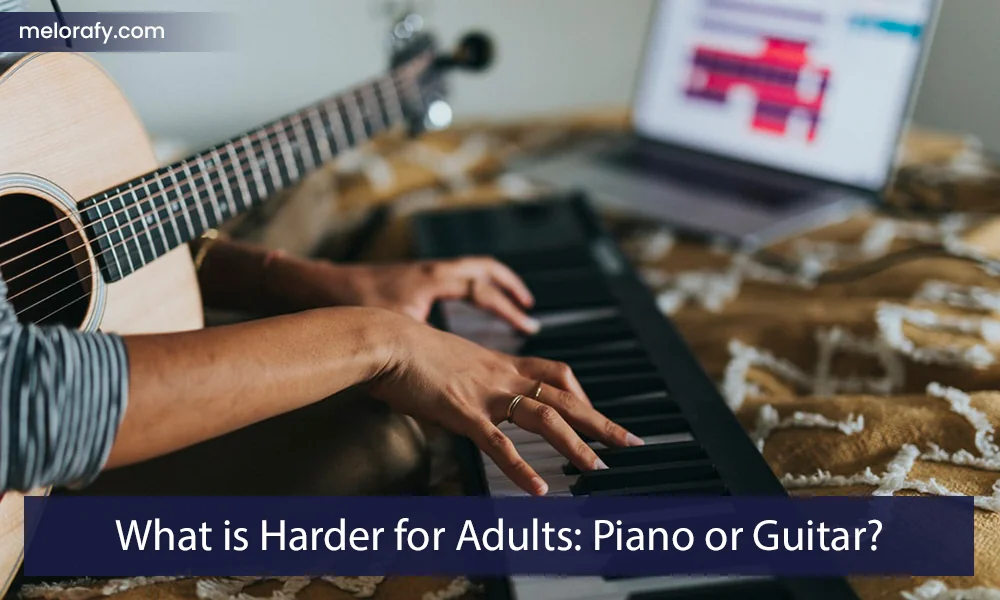
What is Harder for Adults: Piano or Guitar?
Choosing between learning piano and guitar is a common dilemma for many adults entering the world of music. Both instruments offer unique challenges and joys, but the question remains: which is harder for an adult beginner to learn? This article from Melorafy looks at the different aspects of learning piano and guitar, with the aim of a comprehensive comparison to help you make an informed decision.
Music, an integral part of human culture, is a medium through which we express emotions, tell stories, and connect with others. For adults looking to start their musical journey, choosing the right instrument is crucial. The piano and guitar are two of the most popular choices, each with its own set of challenges and rewards.
The Piano: A Symphony at Your Fingertips
The Layout and Mechanism
The piano, with its black and white keys, presents a visual representation of music theory. Learning to read piano music involves understanding the correlation between the notes on the sheet and the keys. This can be daunting for beginners but offers a solid foundation in music theory.
Hand Coordination and Technique
Playing the piano requires independent hand coordination from the start. The ability to play different rhythms and melodies with each hand is a challenge that requires practice and patience.
Accessibility and Practice
Digital pianos and keyboards offer a more accessible option for home practice due to their size and cost compared to acoustic pianos. However, the need for a dedicated space and the commitment to regular practice are essential.
![]()
The Guitar: Strumming the Strings of Emotion
The Physical Aspect
Learning to press the strings correctly to produce a clear sound, and managing hand and finger pain, are initial hurdles for guitar learners. Building calluses and developing muscle memory are part of the journey.
Chords and Fingerstyle
The guitar offers the ability to play chords, providing accompaniment for songs, which can be rewarding for beginners. Learning fingerstyle guitar, however, introduces a complexity similar to playing piano with both hands.
Portability and Versatility
The guitar’s portability makes it a favorite for many. It’s versatile, suitable for a range of musical styles, from classical to rock. Practice can be more spontaneous, without the need for a large setup.
Adult Learners: Facing the Challenges
Adults face unique challenges when learning an instrument, from limited time due to work and family commitments to physical constraints like reduced finger flexibility. Yet, the cognitive and emotional benefits of learning music, such as improved memory, stress relief, and personal fulfillment, make these challenges worth tackling.
![]()
Making the Choice
Consider Your Musical Goals
Consider whether you’re more drawn to classical music, jazz, pop, or rock. Your preferred genre can influence your choice, as certain styles are more suited to either the piano or guitar.
Reflect on Your Lifestyle
Your lifestyle and available space may affect your choice. If you travel often or have limited living space, a guitar might be more practical. Conversely, if you’re interested in composing or producing music, a digital piano or keyboard could offer more versatility.
Try Before You Buy
If possible, try both instruments before making a decision. Many music stores offer trial lessons or rental options. This hands-on experience can be invaluable in making your choice.
![]()
Can I learn both the piano and guitar?
Yes, learning both is possible and can be beneficial, as skills on one instrument can complementthe other. However, it’s advisable to focus on one at the beginning to avoid overwhelming yourself.
How long does it take to become proficient?
Proficiency depends on factors like practice frequency, natural aptitude, and the level of proficiency you’re aiming for. Generally, with consistent practice, noticeable progress can be seen in a few months, but mastery often requires years.
Is age a barrier to learning an instrument?
While younger individuals may find it easier to pick up new skills, there’s no age limit to learning music. Adult learners bring life experience and discipline, which can be advantageous in their musical journey.
What are the benefits of learning music as an adult?
Beyond the joy of music itself, learning an instrument as an adult can improve cognitive function, reduce stress, enhance coordination, and offer a satisfying way to express creativity.
Should I take lessons or learn on my own?
While self-study resources are abundant and useful, taking lessons from a skilled teacher can accelerate your progress, provide structured learning, and help avoid developing bad habits.
Both the piano and the guitar present unique challenges for adult learners. The decision ultimately depends on personal preferences, goals, and lifestyle. Whether you choose the resonant chords of the guitar or the symphonic range of the piano, the journey into music is a rewarding one.